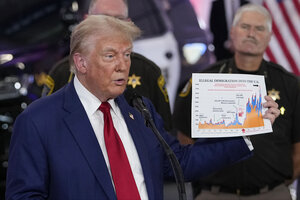Republicans retake Senate as voters reject party in power
Loading...
Former President Donald Trump’s sweeping electoral victory extended to downballot Republicans, who wrested control of the U.S. Senate away from Democrats. The GOP flipped two Senate seats in Ohio and West Virginia, and as of Wednesday afternoon seemed likely to grow their majority with wins in Rust Belt and Western states where votes were still being counted.
Control of the U.S. House remained too close to call, but it’s entirely possible Republicans will hold both chambers of Congress along with the White House.
Why We Wrote This
Voters have put the U.S. Senate back under Republican control. One upshot: They will hold the keys to approving nominees for executive branch posts, federal judgeships, and the Supreme Court.
In a year when Democrats had more seats to defend than Republicans, they had hoped to save their majority by perhaps flipping a few seats of their own in Florida and Texas. But it was not to be, as Republican Sens. Rick Scott of Florida and Ted Cruz of Texas held their ground, with voters punishing Democrats over the economy and immigration.
In Ohio, Republican Bernie Moreno ousted incumbent Democrat Sherrod Brown, with criticism of Democrats on border security helping the Colombian-born businessman to victory.
Popular West Virginia Gov. Jim Justice handily won the Senate seat being vacated by retiring Sen. Joe Manchin, the independent who caucused with Democrats.
Former President Donald Trump’s sweeping electoral victory extended to downballot Republicans, who wrested control of the U.S. Senate away from Democrats. The GOP flipped two Senate seats in Ohio and West Virginia, and as of Wednesday afternoon seemed likely to grow their majority with wins in Rust Belt and Western states where votes were still being counted.
Control of the U.S. House remained too close to call, but it’s entirely possible Mr. Trump will come back to Washington having won a trifecta, with both chambers of Congress in Republican hands.
In a year when Democrats had more seats to defend than Republicans, they had hoped to save their majority by perhaps flipping a few seats of their own in Florida and Texas. But it was not to be, as Republican Sens. Rick Scott of Florida and Ted Cruz of Texas held their ground, with voters punishing Democrats over the economy and immigration.
Why We Wrote This
Voters have put the U.S. Senate back under Republican control. One upshot: They will hold the keys to approving nominees for executive branch posts, federal judgeships, and the Supreme Court.
In Ohio, Republican Bernie Moreno ousted incumbent Democrat Sherrod Brown, with criticism of Democrats on border security helping the Colombian-born businessman to victory.
Popular West Virginia Gov. Jim Justice handily won the Senate seat being vacated by retiring Sen. Joe Manchin, the independent who caucused with Democrats. Mr. Justice was so confident of victory he barely even campaigned against his opponent, Glenn Elliott, the Democratic former mayor of Wheeling.
“In the primary, I didn’t put a sign out,” he said during a press conference. “Think about this for a second: I didn’t put one single sign up, and I won by 35-plus points. The people of this state know me. They know me, and they know me really well. I’ve done almost zero campaigning.”
The Senate switch will put Republicans in charge of the agenda in that chamber. They will hold the keys to executive branch nominations and federal judgeships, as well as any vacancies that might arise at the Supreme Court.
“Trump will be able to get any confirmations that he likes,” says Jeffery Jenkins, a public policy professor at the University of Southern California.
And right off the bat, lawmakers will be staring at an expiring federal debt ceiling and tax cuts from the first Trump administration that will end at the conclusion of 2025.
“The stakes are going to be really high. Right out of the box they’re going to have to deal with government spending, raising the debt limit,” says Kevin Kosar, an expert on Congress at the American Enterprise Institute.
But first, Republicans will need to pick their new majority leader in a secret-ballot election set for next week. In the running are South Dakota Sen. John Thune, the No. 2 Senate Republican; Texas Sen. John Cornyn, who termed out of GOP leadership; and Sen. Rick Scott of Florida. Both Senators Thune and Cornyn are more traditional conservatives, while Senator Scott has deep ties to the party’s right wing, says Sarah Binder, a political science professor at The George Washington University who has long studied Congress.
Staunch Trump loyalist Sen. Mike Lee of Utah appears to be playing kingmaker. He has announced that each of the candidates has agreed to participate at a forum that he will moderate on Nov. 12. At the same time, he has issued a letter to colleagues, calling for Senate reforms, especially allowing more freedom for senators to offer amendments on legislation and engage in extended debate.
Senator Cruz of Texas, an ally of Senator Lee, this week described outgoing Senate Minority Leader Mitch McConnell as a “one-man dictator.” Senator McConnell, from Kentucky, is the longest-serving Republican Senate leader in history and is stepping down from leadership at the end of this year.
Senator McConnell, speaking to reporters on Wednesday morning, said he believed the GOP’s victory would help preserve the filibuster.
“One of the most gratifying results of the Senate becoming Republican: The filibuster will stand, there won’t be any new states admitted that will benefit the other side, and we’ll quit beating up the Supreme Court every time they make a decision we don’t like,” he said.
For many years, the Senate has been sliding toward more control by party leaders. “There’s been a lot of complaints among senators about feeling like they’re eunuchs at the court,” says Mr. Kosar.
But senators also have themselves to blame, says Dr. Binder, in part because they want protection from amendment votes that could damage them politically. “They’ve not really fought back,” she says.
Mr. Trump is expected to push his agenda of tax cuts and a restrictive approach to immigration. On trade, Congress long ago ceded power to the president to impose sanctions and raise tariffs.
But a Republican Senate will not necessarily walk in lockstep with Mr. Trump. In the Middle East, Ukraine, and Taiwan, “different levels of peril will test the Republicans’ comfort with interjecting themselves,” says Mr. Kosar. And will anyone want to stick their neck out on immigration after they saw Mr. Trump squelch a bipartisan bill on border security?
Regardless of the final constellation of party alignment in Washington, Dr. Binder doesn’t see a Senate that accomplishes much beyond addressing taxes in the next year or two. “That will absorb most of the energies of a Republican Senate.”
Editor’s note: This story, which was originally published at 12:40 a.m. on Wednesday, Nov. 6, has been updated to reflect ongoing developments.



















